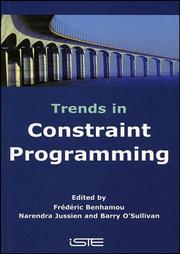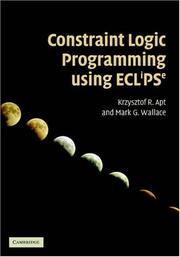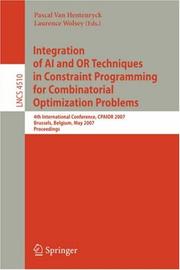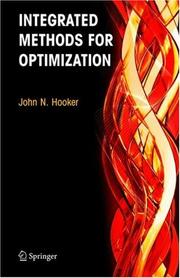| Listing 1 - 7 of 7 |
Sort by
|

ISBN: 1905209975 9781905209972 Year: 2007 Publisher: London: ISTE,
Abstract | Keywords | Export | Availability | Bookmark
 Loading...
Loading...Choose an application
- Reference Manager
- EndNote
- RefWorks (Direct export to RefWorks)
Book
ISBN: 1107170257 1281085715 9786611085711 0511350546 0511348746 0511347774 0511573391 0511607407 0511349661 Year: 2007 Publisher: Cambridge : Cambridge University Press,
Abstract | Keywords | Export | Availability | Bookmark
 Loading...
Loading...Choose an application
- Reference Manager
- EndNote
- RefWorks (Direct export to RefWorks)
Constraint logic programming lies at the intersection of logic programming, optimisation and artificial intelligence. It has proved a successful tool in many areas including production planning, transportation scheduling, numerical analysis and bioinformatics. Eclipse is one of the leading software systems that realise its underlying methodology. Eclipse is exploited commercially by Cisco, and is freely available and used for teaching and research in over 500 universities. This book has a two-fold purpose. It's an introduction to constraint programming, appropriate for one-semester courses for upper undergraduate or graduate students in computer science or for programmers wishing to master the practical aspects of constraint programming. By the end of the book, the reader will be able to understand and write constraint programs that solve complex problems. Second, it provides a systematic introduction to the Eclipse system through carefully-chosen examples that guide the reader through the language and illustrate its power, versatility and utility.

ISBN: 9780521866286 0521866286 9780511607400 Year: 2007 Publisher: Cambridge: Cambridge university press,
Abstract | Keywords | Export | Availability | Bookmark
 Loading...
Loading...Choose an application
- Reference Manager
- EndNote
- RefWorks (Direct export to RefWorks)
Constraint programming (Computer science) --- Logic Programming --- Logic programming. --- 681.3*D32 --- language classifications: applicative languages; data-flow languages; design languages; extensible languages; macro and assembly languages; nonprocedural languages; specialized application and very high-level languages (Programminglanguages) --- 681.3*D32 language classifications: applicative languages; data-flow languages; design languages; extensible languages; macro and assembly languages; nonprocedural languages; specialized application and very high-level languages (Programminglanguages) --- Logic programming --- Computer programming --- Programmation logique --- Programmation par contraintes

ISSN: 03029743 ISBN: 9783540723967 354072396X 9786610949212 128094921X 3540723978 Year: 2007 Volume: 4510 Publisher: Berlin: Springer,
Abstract | Keywords | Export | Availability | Bookmark
 Loading...
Loading...Choose an application
- Reference Manager
- EndNote
- RefWorks (Direct export to RefWorks)
This book constitutes the refereed proceedings of the 4th International Conference on Integration of AI and OR Techniques in Constraint Programming for Combinatorial Optimization Problems, CPAIOR 2007, held in Brussels, Belgium in May 2007. The 27 revised full papers presented were carefully reviewed and selected from 80 submissions. Methodological and foundational issues from AI, OR, and algorithmics are presented as well as applications to the solution of combinatorial optimization problems in various fields via constraint programming.
Constraints (Artificial intelligence) --- Constraint programming (Computer science) --- Combinatorial optimization --- Artificial intelligence --- Operations research --- Contraintes (Intelligence artificielle) --- Programmation par contraintes --- Optimisation combinatoire --- Intelligence artificielle --- Recherche opérationnelle --- Congresses. --- Technique --- Congrès --- Data processing --- Artificial intelligence -- Congresses. --- Combinatorial optimization -- Congresses. --- Constraint programming (Computer science) -- Congresses. --- Constraints (Artificial intelligence) -- Congresses. --- Operations research -- Congresses. --- Computer Science --- Applied Mathematics --- Engineering & Applied Sciences --- Constraint satisfaction (Artificial intelligence) --- Computer science. --- Operations research. --- Decision making. --- Algorithms. --- Numerical analysis. --- Computer science --- Artificial intelligence. --- Combinatorics. --- Computer Science. --- Artificial Intelligence (incl. Robotics). --- Numeric Computing. --- Discrete Mathematics in Computer Science. --- Algorithm Analysis and Problem Complexity. --- Operation Research/Decision Theory. --- Mathematics. --- Combinatorics --- Algebra --- Mathematical analysis --- AI (Artificial intelligence) --- Artificial thinking --- Electronic brains --- Intellectronics --- Intelligence, Artificial --- Intelligent machines --- Machine intelligence --- Thinking, Artificial --- Bionics --- Cognitive science --- Digital computer simulation --- Electronic data processing --- Logic machines --- Machine theory --- Self-organizing systems --- Simulation methods --- Fifth generation computers --- Neural computers --- Computer mathematics --- Discrete mathematics --- Algorism --- Arithmetic --- Deciding --- Decision (Psychology) --- Decision analysis --- Decision processes --- Making decisions --- Management --- Management decisions --- Choice (Psychology) --- Problem solving --- Operational analysis --- Operational research --- Industrial engineering --- Management science --- Research --- System theory --- Informatics --- Science --- Mathematics --- Foundations --- Decision making --- Electronic data processing. --- Computational complexity. --- Computer software. --- Artificial Intelligence. --- Operations Research/Decision Theory. --- Software, Computer --- Computer systems --- Complexity, Computational --- ADP (Data processing) --- Automatic data processing --- EDP (Data processing) --- IDP (Data processing) --- Integrated data processing --- Computers --- Office practice --- Automation --- Computer science—Mathematics. --- Combinatorial optimization - Data processing - Congresses --- Constraint programming (Computer science) - Congresses --- Constraints (Artificial intelligence) - Congresses --- Operations research - Technique - Congresses --- Artificial intelligence - Technique - Congresses --- Discrete mathematics. --- Numerical Analysis. --- Operations Research and Decision Theory. --- Discrete Mathematics. --- Discrete mathematical structures --- Mathematical structures, Discrete --- Structures, Discrete mathematical --- Numerical analysis

ISBN: 0387382747 0387382720 1441942580 9780387382722 Year: 2007 Volume: 100 Publisher: New York, N.Y.: Springer,
Abstract | Keywords | Export | Availability | Bookmark
 Loading...
Loading...Choose an application
- Reference Manager
- EndNote
- RefWorks (Direct export to RefWorks)
Integrated Methods for Optimization integrates the key concepts of Mathematical Programming and Constraint Programming into a unified framework that allows them to be generalized and combined. The unification of MP and CP creates optimization methods that have much greater modeling power, increased computational speed, and a sizeable reduction computational coding. Hence the benefits of this integration are substantial, providing the Applied Sciences with a powerful, high-level modeling solution for optimization problems. As reviewers of the book have noted, this integration along with constraint programming being incorporated into a number of programming languages, brings the field a step closer to being able to simply state a problem and having the computer solve it. John Hooker is a leading researcher in both the Optimization and Constraint Programming research communities. He has been an instrumental principal for this integration, and over the years, he has given numerous presentations and tutorials on the integration of these two areas. It is felt by many in the field that the future Optimization courses will increasingly be taught from this integrated framework.
Mathematical optimization. --- Programming (Mathematics) --- Constraint programming (Computer science) --- Computer science --- Mathematical models. --- Optimization (Mathematics) --- Optimization techniques --- Optimization theory --- Systems optimization --- Mathematical analysis --- Maxima and minima --- Operations research --- Simulation methods --- System analysis --- Informatics --- Science --- Computer programming --- Mathematical programming --- Goal programming --- Algorithms --- Functional equations --- Mathematical optimization --- Operations research. --- Artificial intelligence. --- Computer science. --- Business. --- Optimization. --- Operations Research/Decision Theory. --- Artificial Intelligence. --- Mathematics of Computing. --- Mathematical Modeling and Industrial Mathematics. --- Business and Management, general. --- Trade --- Economics --- Management --- Commerce --- Industrial management --- AI (Artificial intelligence) --- Artificial thinking --- Electronic brains --- Intellectronics --- Intelligence, Artificial --- Intelligent machines --- Machine intelligence --- Thinking, Artificial --- Bionics --- Cognitive science --- Digital computer simulation --- Electronic data processing --- Logic machines --- Machine theory --- Self-organizing systems --- Fifth generation computers --- Neural computers --- Operational analysis --- Operational research --- Industrial engineering --- Management science --- Research --- System theory --- Decision making. --- Computer science—Mathematics. --- Management science. --- Quantitative business analysis --- Problem solving --- Statistical decision --- Models, Mathematical --- Deciding --- Decision (Psychology) --- Decision analysis --- Decision processes --- Making decisions --- Management decisions --- Choice (Psychology) --- Decision making --- Computer science - Mathematical models
Book

ISBN: 9783540738169 3540738169 3540738177 Year: 2007 Publisher: Berlin, Heidelberg : Springer Berlin Heidelberg : Imprint: Springer,
Abstract | Keywords | Export | Availability | Bookmark
 Loading...
Loading...Choose an application
- Reference Manager
- EndNote
- RefWorks (Direct export to RefWorks)
Constraint programming (Computer science) --- Logic programming --- Programmation par contraintes --- Programmation logique --- Congresses. --- Congrès --- Computer Science --- Mechanical Engineering - General --- Engineering & Applied Sciences --- Mechanical Engineering --- Information Technology --- Artificial Intelligence --- Computer science. --- Programming languages (Electronic computers). --- Algorithms. --- Computer logic. --- Mathematical logic. --- Numerical analysis. --- Artificial intelligence. --- Computer Science. --- Artificial Intelligence (incl. Robotics). --- Programming Languages, Compilers, Interpreters. --- Logics and Meanings of Programs. --- Algorithm Analysis and Problem Complexity. --- Numeric Computing. --- Mathematical Logic and Formal Languages. --- AI (Artificial intelligence) --- Artificial thinking --- Electronic brains --- Intellectronics --- Intelligence, Artificial --- Intelligent machines --- Machine intelligence --- Thinking, Artificial --- Bionics --- Cognitive science --- Digital computer simulation --- Electronic data processing --- Logic machines --- Machine theory --- Self-organizing systems --- Simulation methods --- Fifth generation computers --- Neural computers --- Mathematical analysis --- Algebra of logic --- Logic, Universal --- Mathematical logic --- Symbolic and mathematical logic --- Symbolic logic --- Mathematics --- Algebra, Abstract --- Metamathematics --- Set theory --- Syllogism --- Computer science logic --- Logic, Symbolic and mathematical --- Algorism --- Algebra --- Arithmetic --- Computer languages --- Computer program languages --- Computer programming languages --- Machine language --- Languages, Artificial --- Informatics --- Science --- Foundations --- Logic design. --- Computer software. --- Electronic data processing. --- Artificial Intelligence. --- ADP (Data processing) --- Automatic data processing --- Data processing --- EDP (Data processing) --- IDP (Data processing) --- Integrated data processing --- Computers --- Office practice --- Software, Computer --- Computer systems --- Design, Logic --- Design of logic systems --- Digital electronics --- Electronic circuit design --- Logic circuits --- Switching theory --- Automation
Book
ISBN: 9783540749691 3540749691 3540749705 Year: 2007 Publisher: Berlin ; New York : Springer,
Abstract | Keywords | Export | Availability | Bookmark
 Loading...
Loading...Choose an application
- Reference Manager
- EndNote
- RefWorks (Direct export to RefWorks)
The 13th International Conference on Principles and Practice of Constraint Programming (CP 2007) was held in Providence, RI, USA, September 23–27, 2007, in conjunction with the International Conference on Automated Planning and Scheduling (ICAPS). Held annually, the CP conference series is the premier international conference on constraint programming. The conference focuses on all aspects of computing with constraints. The CP conference - ries is organized by the Association for Constraint Programming (ACP). - formation about the conferences in the series can be found on the Web at http://www. cs. ualberta. ca/~ai/cp/. Information about ACP can be found athttp://www. a4cp. org/. CP 2007 launched two calls for contributions: a call for research papers, describing novel contributions in the ?eld, and a call for application papers, describing applications of constraint technology in the industrial world. The research track received 143 submissions and the application track received 22 submissions. Research papers were reviewed under a double-blind scheme. They received three reviews that the authors had the opportunity to see and to react tobeforethepapersandtheirreviewswerediscussedextensivelybythemembers of the Program Committee. Application papers were reviewed by a separate- plication Committee. The Program Committee and the Application Committee then selected 43 research papers and 9 application papers to be published in full in the proceedings,andanadditional14researchpapersto be published as short papers. The full papers were presented at the conference in two parallel tracks and the short papers were presented in a poster session.
Constraint programming (Computer science) --- Programmation par contraintes --- Congresses. --- Congrès --- Computer Science --- Engineering & Applied Sciences --- Information Technology --- Computer Science (Hardware & Networks) --- Computer science. --- Software engineering. --- Computer programming. --- Programming languages (Electronic computers). --- Computer logic. --- Mathematical logic. --- Artificial intelligence. --- Computer Science. --- Software Engineering/Programming and Operating Systems. --- Programming Techniques. --- Programming Languages, Compilers, Interpreters. --- Artificial Intelligence (incl. Robotics). --- Logics and Meanings of Programs. --- Mathematical Logic and Formal Languages. --- AI (Artificial intelligence) --- Artificial thinking --- Electronic brains --- Intellectronics --- Intelligence, Artificial --- Intelligent machines --- Machine intelligence --- Thinking, Artificial --- Bionics --- Cognitive science --- Digital computer simulation --- Electronic data processing --- Logic machines --- Machine theory --- Self-organizing systems --- Simulation methods --- Fifth generation computers --- Neural computers --- Algebra of logic --- Logic, Universal --- Mathematical logic --- Symbolic and mathematical logic --- Symbolic logic --- Mathematics --- Algebra, Abstract --- Metamathematics --- Set theory --- Syllogism --- Computer science logic --- Logic, Symbolic and mathematical --- Computer languages --- Computer program languages --- Computer programming languages --- Machine language --- Languages, Artificial --- Computers --- Electronic computer programming --- Electronic digital computers --- Programming (Electronic computers) --- Coding theory --- Computer software engineering --- Engineering --- Informatics --- Science --- Programming --- Logic design. --- Artificial Intelligence. --- Design, Logic --- Design of logic systems --- Digital electronics --- Electronic circuit design --- Logic circuits --- Switching theory
| Listing 1 - 7 of 7 |
Sort by
|

 Search
Search Feedback
Feedback About UniCat
About UniCat  Help
Help News
News